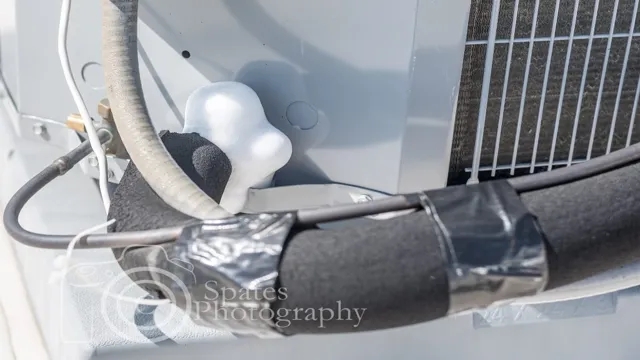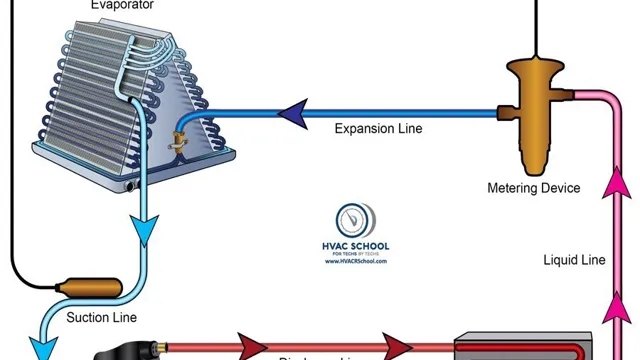Air Conditioner Pipes Freezing: Causes and Solutions
Are you wondering why your air conditioner pipes are freezing? There could be several reasons for this, including low refrigerant levels, dirty air filters, damaged evaporator coils, or even issues with the thermostat. When the refrigerant levels are low, the AC unit works harder to cool down the space, leading to freezing pipes. Similarly, if the air filters are not cleaned or replaced regularly, they can become clogged, reducing air flow and causing the evaporator coils to freeze over.
Additionally, broken or damaged coils can cause the AC unit to malfunction and lead to frozen pipes. Therefore, it’s important to schedule regular maintenance checks to ensure your AC unit is functioning efficiently and to address any issues before they become more serious. If you’re experiencing frozen pipes, turn off the AC immediately and contact a professional to diagnose and fix the problem.
Introduction
Air conditioner pipes can freeze up, causing a lot of issues for your AC unit. This is a common problem that homeowners face, and there are a few reasons why it can happen. One reason is that your AC unit might be low on refrigerant.
When there isn’t enough refrigerant in the system, the pressure drops, causing the coils in your AC unit to freeze. Another reason could be a clogged air filter. When your air filter is dirty, it restricts the airflow, causing the temperature to drop and the coils to freeze.
To prevent your AC unit from freezing up, make sure you’re changing your air filter regularly and having your system checked by a professional. It’s always better to catch any potential issues before they turn into bigger problems. So, if you notice that your AC unit isn’t working as well as it should, give us a call, and we’ll be happy to help you out.
What is air conditioner pipe freezing?
Air conditioner pipe freezing is a common issue that many homeowners face during the summer months. This occurs when the temperature of the coils inside the unit drops below freezing point, causing moisture to accumulate and freeze on the pipes. Some of the common reasons for air conditioner pipe freezing include low refrigerant levels, clogged air filters, and malfunctioning thermostats.
This can lead to reduced airflow and cooling capacity, as well as costly repairs if not addressed promptly. To prevent air conditioner pipe freezing, it is important to regularly clean or replace air filters, check refrigerant levels, and ensure proper thermostat settings. If you notice your air conditioner pipes freezing, it is best to turn the unit off and consult a professional HVAC technician to avoid any potential damage or further issues.

Causes of air conditioner pipe freezing
Air conditioner pipes can freeze for various reasons, causing inconvenience and discomfort to homeowners. One of the primary reasons is the presence of moisture or humidity in the air conditioning system. When the temperature drops, the moisture freezes, causing ice to form on the coils.
This ice buildup restricts the air conditioning unit’s airflow, leading to the unit’s inefficiency and ultimately its total malfunction. Other possible causes of pipe freezing include refrigerant leaks, low refrigerant levels, or malfunctioning motors. To prevent air conditioner pipe freezing, homeowners must ensure that their AC unit receives routine maintenance checks, clean or replace filters regularly, and keep the thermostat set at a consistent temperature.
Additionally, if you notice any unusual sounds coming from your AC unit or a lack of cool air, it is best to contact a professional HVAC technician to inspect and repair the problem. By keeping your AC unit well-maintained and addressing any issues promptly, you can avoid costly repairs and maintain a comfortable living environment.
Inadequate Airflow
Air conditioner pipes freezing can be a frustrating experience, but it’s not uncommon. One of the main causes of this issue is inadequate airflow. When the airflow system is compromised, the air conditioning unit has to work harder to maintain the desired temperature.
This extra effort causes the pipes to freeze and can result in a complete system breakdown if not addressed. Common causes of inadequate airflow include blocked air filters, dirty coils, and closed air ducts. To prevent this problem, it’s important to schedule regular maintenance checks and clean or replace any dirty components.
Additionally, it’s essential to keep all air vents unobstructed for proper air circulation. If you’re experiencing air conditioner pipes freezing, it’s best to consult a professional technician to diagnose and repair the issue before it escalates. By taking these preventative measures, you can ensure maximum airflow and prevent your air conditioner pipes from freezing.
Low Refrigerant Levels
One of the common reasons for frozen air conditioner pipes is low refrigerant levels. Refrigerant is a vital component that cools the air in your system, so if there’s a deficiency, your system won’t run efficiently. Low refrigerant causes pressure in the system to drop, which can lead to an unexpected temperature drop, ultimately causing the coils to freeze.
If you suspect that low refrigerant levels are the cause of your frozen pipes, it’s best to call in an HVAC technician to address the issue. They will locate and fix the leak, recharge the system with refrigerant, and ensure that your air conditioner is working at peak efficiency. In the meantime, turn off your air conditioner and let the pipes defrost completely, as running a frozen system could cause severe damage to your compressor.
By resolving low refrigerant levels, you can reduce the chances of experiencing costly frozen pipes in the future.
Thermostat Problems
If you notice that your air conditioner pipes are freezing, it’s time to take action before you have a bigger problem on your hands. One of the most common causes of this issue is low refrigerant levels in the system, which can cause the evaporator coil to get too cold and freeze the pipes. Other possible causes include dirty air filters, blocked ducts, or a faulty thermostat.
To prevent the pipes from freezing, you can try changing the air filters regularly, making sure the ducts are clear of any blockages, and ensuring that the thermostat is set correctly. If you’re not comfortable handling these tasks on your own, it’s always best to call in a professional to diagnose and solve the problem. Remember, preventing the pipes from freezing is important for the longevity and efficiency of your air conditioner system.
Dirty Filters
Dirty filters can cause a lot of issues for air conditioners, one of which is frozen pipes. When the air filter becomes clogged with dust and debris, it restricts airflow over the evaporator coil. This obstruction in the system results in the freezing of water that’s meant to be drained from the AC unit’s evaporator coil.
If left untreated, frozen air conditioner pipes can cause major damage to your AC unit and even result in costly repairs, or worse an entirely new unit. The best solution to prevent frozen pipes is to regularly check your air filters and clean or replace them when necessary. It’s also a good idea to have your AC system professionally maintained at least once per year before the hot summer months.
By doing this, you can avoid future problems or frozen pipes and ensure your AC is running efficiently throughout the season. Remember that regular maintenance can save you time, money, and the headache of repairing a damaged system.
Solutions to air conditioner pipe freezing
Air conditioner pipes freezing is a common problem that most homeowners experience at one point or the other. This can be caused by various factors such as poor airflow, low refrigerant levels, or even a malfunctioning thermostat. One of the most common reasons for pipes freezing is inadequate insulation.
Insufficient insulation causes the cold air inside the pipe to come in contact with the warmer, humid air outside, leading to condensation and eventual freezing of the pipes. Other factors such as a dirty air filter or low airflow can also contribute to pipe freezing. To avoid this, it is important to ensure that your air conditioner receives regular maintenance, and the filters and coils are clean.
Additionally, ensuring proper insulation and airflow in your home can also help to prevent pipes from freezing. If you notice your pipes freezing, it is important to turn off your air conditioner immediately and call an HVAC professional to address the issue. Overall, regular maintenance and proper insulation can help prevent air conditioner pipes from freezing, ensuring your HVAC system operates efficiently and reliably year-round.
Proper Insulation
Air conditioners rely on proper insulation to function effectively, but when their pipes freeze, it can cause significant problems. There are a few reasons why this might happen, and one of the most common is a lack of proper insulation. If the pipes aren’t adequately insulated, they can get too cold and freeze up.
This can lead to reduced airflow, poor performance, and even damage to the unit itself. Fortunately, there are solutions available that can help prevent air conditioner pipes from freezing. One option is to add more insulation to the pipes to keep them warm and protect them from the cold.
Another solution is to ensure proper airflow and ventilation, which can help regulate the temperature and prevent freezing. Ultimately, the key is to ensure that your air conditioner is properly maintained and serviced to prevent problems from arising in the first place. With the right care and attention, you can help your air conditioner operate smoothly and effectively for years to come.
Regular Maintenance
Air conditioner pipes are essential components of your AC unit, responsible for transporting the refrigerant that cools the air. However, these pipes can freeze due to various reasons, such as low refrigerant levels, clogged air filters, or dirty evaporator coils. When the pipes freeze, your AC unit may not function correctly and could even shut down entirely.
To prevent this, it’s crucial to perform regular maintenance on your AC unit, keeping the air filters clean, checking refrigerant levels, and having a professional clean the evaporator coils. By ensuring that your AC unit is well-maintained, you can avoid the inconvenience and expense of a broken AC system during the hot summer months. So, don’t neglect your AC pipes and perform regular maintenance to keep them in good working order and your home cool and comfortable.
Conclusion
In the world of air conditioning, freezing pipes are the kryptonite to a cool and comfortable home. While it may seem counterintuitive, the culprit behind this chilly conundrum is often lack of air flow. So, don’t let your AC turn into an icy fortress – keep your filters clean, maintain proper levels of refrigerant, and ensure proper airflow to stay frost-free and cool all summer long!”
FAQs
Why is my air conditioner pipes freezing?
There are various reasons for air conditioner pipes to freeze, such as low refrigerant levels, dirty air filters, blocked vents, or faulty blower motors.
How can I prevent my air conditioner pipes from freezing?
Some ways to prevent air conditioner pipes from freezing include maintaining proper refrigerant levels, changing/cleaning air filters regularly, keeping vents unobstructed, and performing regular maintenance checks on the blower motor.
Can I still use my air conditioner if the pipes are frozen?
It is not recommended to use your air conditioner if the pipes are frozen, as it can put strain on the system and cause further damage. It’s best to turn off your AC and call a professional to inspect and repair the issue.
How much does it cost to repair frozen air conditioner pipes?
The cost of repairing frozen air conditioner pipes can vary depending on the cause and extent of the damage. It is best to have a professional inspect and provide an estimate for the necessary repairs.

